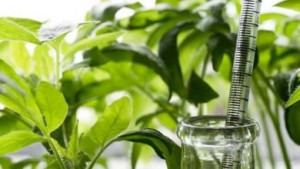Biotech crops-A Nobel Laureate makes a strong case!
Anybody cares for biotech crops? Biotechnology?
 Yes, sometimes big time industry too often forgets the humble beginnings of big things. One such is biotechnology industry. Who are all the big stars today?
Yes, sometimes big time industry too often forgets the humble beginnings of big things. One such is biotechnology industry. Who are all the big stars today?
Like IT also we do the same mistake. How many know how the IT revolution started in India. The very now big TCS (expansion Tata Consulting Services) was for long called simply as Tata Consulting Engineers, then Tata Consultants and there was also one Tata Economic Consultancy Services. The gentleman who started the TCS was one Dr.Lalith Kanodia from Harvard, whom we used to meet often then in Mumbai at the Tata House (Bombay House).Now it is all a forgotten story!
So too, we can say about the Biotech story. Vadamalai Media long before in 1985 published a survey called, Biotechnology and Industry Survey (edited by Dr.Jitendra Prasad, then fresh from the Twynford Laboratories, London).He was a plant biotechnologist, working then at the Bangalore -based Indo-American Hybrid Seeds. The volume was priced at Rs.1, 000.When the first copy we brought to Bangalore, (it was published from Chennai), the first person who rushed to our office and took a copy was from the Tata Consulting Engineers, then, at Millers Road, Bangalore. He took a copy free promising to return but when he delayed we rushed to collect our precious copy! It was considered a first attempt and a rare topic and we feared it might be pirated by others!
So, when the Indian government started the biotechnology department, it was Vadamalai Media that was courted. We were made a premium member of the club the department started then and ironically were the only sources of information for the officials. Now, they have grown big and the biotechnology industry itself had grown beyond recognition.
Now, while the biotech industry has grown, the agri biotech segments have remained a bit sluggish.
There was then only one lone Indo-American Hybrid Seeds in Bangalore but now there are a growing number of new biotech ventures. There is also growing opposition to the biotech crops. There are so many anti-biotech lobbies and as a result the many urgent tests of many new crops are all stopped.
Now, happily, one reputed Nobel Laureate, Sir Richard John Roberts from Britain, a molecular biologist, had come to India and in his lectures at the Mysore university and in Hyderabad he has advocated vigorously the case for trying GMOs, Genetically Modified Organisms.
He argues that there is a need for more food to feed the hungry millions within the developing countries. Also the developed countries can import food but the developing countries must find food within themselves.
The Nobel Laureate has a strong case not only on the scientific front but also on the economic and trade fronts also. The latest WTO negotiations just now in session in Nairobi only show too clearly there are huge differences among members on the role of agriculture trade in the developed and developing countries.
USA,EU and Japan give huge agri subsidies and the developing countries are restricted, specially India’s special pleadings to safeguard Indian farmers, the poor farmers for the special safeguarding mechanisms(SSMs) to procure food at rates that would enable for India to carry out the huge works programmes for rural farmers, others.
India is a huge agricultural economy and farmers, specially need security from international economic and trade fluctuations.
So, India needs urgently new agri policies. One such is the need to allow biotech crops in a range of crops, cereals specially.
Sir. Roberts also pleased for the Golden Rice to tackle the vitamin A deficiency.
Anyway, now heavyweight scientists had lent his argument for biotech research we need a new programme for enhancing India’s agricultural productivity and also to tackle the issues of drought and other natural calamities that hit Indian agriculture more frequently.
Farmer’s suicides are now a frequent reality and this too calls for action.